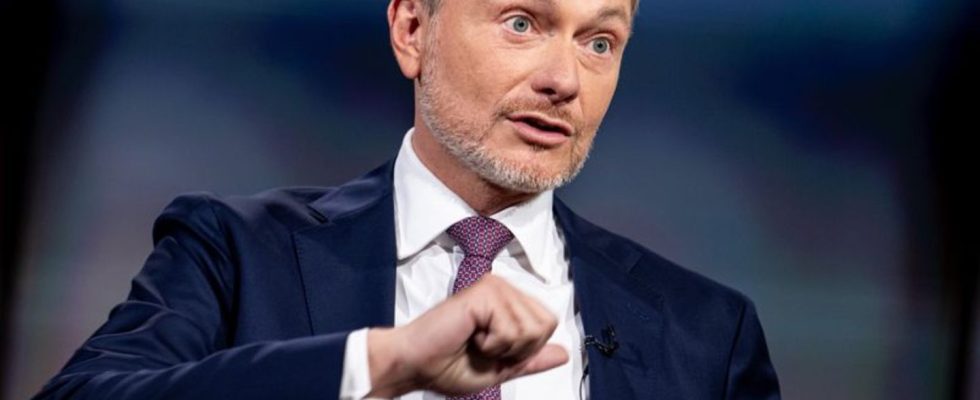On Tuesday, the finance minister will present the draft federal budget for 2024 to the Bundestag. Lindner wants a course of consolidation. However, there is likely to be a need for further advice.
It’s an unfinished household. Federal Finance Minister Christian Lindner (FDP) is presenting the draft budget for 2024 in the Bundestag today. Lindner is on a course of consolidation. However, many budgetary questions remain unanswered. In the course of the parliamentary deliberations, there are likely to be controversial debates in the traffic light coalition of SPD, Greens and FDP.
How big is the federal budget?
The federal government wants to spend 445.7 billion euros in the coming year – that’s around 30 billion less than planned this year, when, as in previous years, there was a lot of crisis-related spending, mainly because of the corona pandemic and the energy crisis. Now the plan is to switch to an austerity course.
Lindner’s guard rails: The debt brake enshrined in the Basic Law, which is controversial in parts of the SPD and the Greens, should be observed at all costs. It only allows net borrowing to a very limited extent. According to the draft, new debt should be 16.6 billion euros in 2024, around 30 billion euros less than this year.
Lindner sees compliance with the debt brake as an essential basis for overcoming budgetary challenges in the coming years – the ministry mentions, among other things, the repayment of billions of loans that were issued to combat the corona pandemic. Lindner also points out that due to rising interest rates, the interest burden of the federal government has increased significantly to around 40 billion euros per year.
Another guard rail of the minister, who is also head of the FDP: no tax increases. That narrows the financial scope. But Lindner emphasizes that the state can only spend the money that the citizens have previously earned.
What does the federal government want to spend money on?
As every year, by far the most money is moved in the budget of the Ministry of Labor and Social Affairs. Almost 172 billion euros are to be made available for this in 2024. That’s more than a third of the entire budget. According to the draft, 127 billion euros in tax money are earmarked for pension insurance alone.
Federal investments are said to be around 54 billion euros, significantly less than in 2023. However, Lindner emphasizes that more is being invested than before the crisis. The Ministry of Finance cites funds for climate protection, digitization, education, social cohesion, internal and external security and transport infrastructure as priorities. So there should be more money for the rail.
All departments – except for defense – had to make savings totaling 3.5 billion euros per year for 2024 and for the financial plan. Savings are to be made, for example, in the budgets of the Ministry of Health and the Ministry of Family Affairs. However, the last word may not yet have been spoken on the planned, controversial parental allowance cap for high-income earners.
The defense budget is expected to increase by 1.7 billion euros to around 51.8 billion euros. However, Defense Minister Boris Pistorius (SPD) cannot be happy about a real increase for 2024, because the amount pretty much only covers the need that is necessary due to tariff increases. The promise of a fully equipped and operational Bundeswehr must now be financed all the more from the 100 billion pot (“special fund”) that is earmarked for major armaments projects.
What role do special funds play?
Federal “special assets” apart from the federal budget play an important role. In addition to the special pot for the Bundeswehr, this is above all the climate and transformation fund, from which billions are invested in projects for climate protection – for example state subsidies for heating replacement. In order for the fund to have more income, the CO2 price should rise more sharply in 2024 than originally planned. This should make heating and refueling with fossil fuels more expensive.
The special assets are under criticism. The Federal Court of Auditors complained that special funds impeded Parliament’s budgetary rights. And: It is more accurate to speak of “special debts”. The President of the Taxpayers’ Association, Reiner Holznagel, criticized the “shadow budgets” for further debts and spending programs worth billions.
What’s next?
The draft budget will now go to parliamentary deliberations. The so-called adjustment meeting of the powerful budget committee is planned for mid-November – there are usually some major changes to the draft. Before that, a new tax estimate takes place. This will show whether and what financial leeway there is.
The budget spokesman for the FDP parliamentary group, Otto Fricke, has already announced that he intends to take a close look at the federal government’s plans to increase citizen income, for example. The Greens, on the other hand, emphasized the social area as a priority.
Another point of contention in the coalition is how energy-intensive companies in particular can be relieved in view of electricity prices, which are high by international standards. Discussions are about a state-subsidized industrial electricity price or a reduction in the electricity tax. There has been massive criticism from business associations that the coalition wants to remove the so-called peak compensation for electricity tax, from which energy-intensive companies will benefit. Lindner emphasized that counter-financing must be provided for planned additional expenditure.
For example, it is unclear whether the reduced VAT rate on food in the catering trade will continue beyond the end of the year. The hospitality industry warns that otherwise thousands of businesses would be threatened with extinction.

